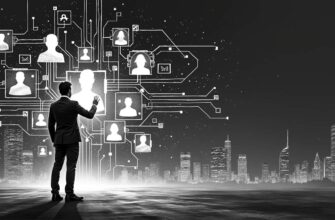So here’s a wild thought: what if Palantir becomes the backbone of U.S. government operations? This idea isn’t just a fantasy; it’s being pushed by some major players in tech, like Elon Musk and Peter Thiel. While the concept of a unified government data system is tantalizing, it also comes with a hefty side dish of concerns about privacy and civil liberties. Let’s dive into the implications of this potential shift and what it means for the future of government tech.
- The Palantir Dream
- Who’s Who in the Zoo
- Blockchain and AI: The New Government Tools
- Efficiency at Scale
- Real-World Applications
- The Ethical Dilemma
- Privacy and Civil Liberties
- Potential Pitfalls
- Bullish on Crypto?
- The Crypto Market
- Regulatory Alignment
- Integration with Decentralized Platforms
- Summary: The Road Ahead
The Palantir Dream
Palantir, co-founded by Thiel, has long been a significant player in the realms of data and analytics for government agencies. Their software is already woven into various U.S. governmental departments, including the DoD, FBI, Army, and even the Space Force. The notion that Palantir could become the official OS for the entire U.S. government seems more plausible than ever, especially with the connections to figures like Musk and Thiel.
Who’s Who in the Zoo
Consider these key players:
- Elon Musk: A name synonymous with innovation, who has a history with Thiel from their PayPal days.
- Peter Thiel: Co-founder of Palantir, a titan in both tech and political circles.
- David Sacks: Another PayPal alum, currently diving deep into AI and crypto.
- Jim O’Neill: Formerly the CEO of Thiel’s foundation and deputy secretary of DHS.
The ties run deep, suggesting a well-connected network that could usher Palantir into deeper government waters.
Blockchain and AI: The New Government Tools
Efficiency at Scale
Blockchain and AI are more than just buzzwords; they hold the potential to revolutionize government efficiency. Imagine a world where Palantir’s software integrates data from countless sources, enabling real-time analysis and decision-making.
Blockchain can make transactions secure and transparent, while AI can automate daily tasks, analyze complex datasets, and provide actionable insights.
Real-World Applications
- Tax Code Simplification: AI could streamline the tax code by identifying redundancies and analyzing their effectiveness.
- Asset Tracking: The IRS could utilize AI to track down assets owned by tax evaders.
- Insider Trading Detection: AI may pinpoint unusual trading patterns, flagging potential insider trading.
- Political Trade Analysis: AI could compare politicians’ trades against market averages, potentially revealing illegal trades.
The Ethical Dilemma
Privacy and Civil Liberties
The integration of Palantir’s software raises valid concerns about privacy and civil liberties. The ability to aggregate and analyze sensitive data could infringe on individual rights.
Potential Pitfalls
- Data Collection: The amount of data collected can violate privacy rights if not properly regulated.
- Predictive Policing: These technologies could lead to discriminatory practices, undermining the presumption of innocence.
- Human Rights Violations: Palantir’s work with agencies like ICE raises serious human rights concerns.
- Intellectual Property Lock-In: Palantir owns the rights to the analyses produced using its software, creating a potential lock-in effect for government agencies.
Bullish on Crypto?
The Crypto Market
Palantir’s role in government could also impact the crypto market. Its software could enhance compliance with upcoming regulations, ensuring secure and transparent transactions.
- Compliance Monitoring: The software may monitor crypto transactions for compliance, reducing fraud.
- Risk Management: The platform’s rule engine would allow for quick implementation of transaction monitoring rules.
- KYC and Sanctions: Advanced KYC and sanctions screening could help VASPs comply with regulations.
Regulatory Alignment
Palantir’s Foundry for Crypto is tailored for virtual asset service providers to comply with evolving regulations. It aligns with the Anti-Money Laundering Act and MiCA, which are set to take effect in the EU.
Integration with Decentralized Platforms
- Cross-Chain Investigations: Palantir’s platform integrates data from various sources, ensuring compliance.
- Operational Resilience: Comprehensive risk management and cybersecurity practices are built-in.
- Scalability and Adaptability: The software is designed for speed and flexibility, allowing agencies to scale while remaining agile.
Summary: The Road Ahead
Palantir’s potential role as a central operating system for U.S. government agencies could bring about significant efficiency and transparency. But let’s not forget the critical concerns regarding privacy and civil liberties. As blockchain and AI technologies evolve, ethical frameworks and regulatory measures will be essential to navigate the risks. The future of government technology is on the horizon, and it’s going to be a complex ride.








